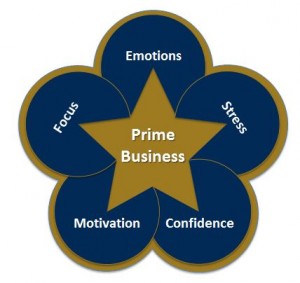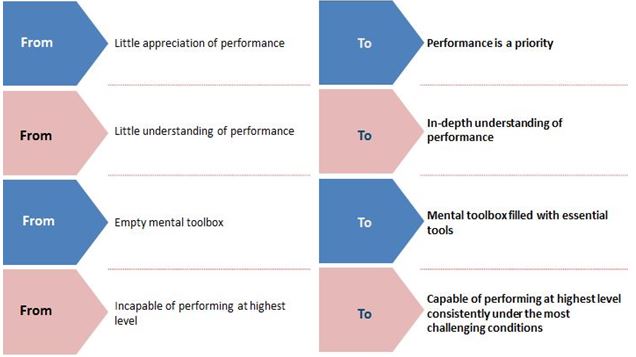In a recent post, I introduced you to The 5 Things Great Leaders Do Very Well, in which I described the five essential roles that leaders must fulfill to be successful:
- Leader as person
- Leader as performer
- Leader as team builder
- Leader as decision maker
- Leader as change agent
In the follow-up post, I explored Leader as Person in which I argue that who you are is how you lead.
In this post, I will examine your role as Leader as Performer and how this focus ensures that you and your team have the necessary tools to maximize your performances and, as a result, your successes.
Performance is so vital because it is the foundation for two higher-order goals of individual and organizational success in the business world: productivity and profitability. The only way to maximize these two is to maximize performance.
Though every business person would agree that the mind plays a central role in business performance, few can clearly articulate the specific areas that influence performance. I define Prime Business as “performing at a consistently high level under the most challenging conditions.” Prime Business is a goal toward which everyone in the business world strives, the result of which is maximizing performance, productivity, and profitability.
But few individuals or companies clearly understand the information and strategies they must use to achieve that goal. Nor do many have a structure and a process for working toward Prime Business.
Prime Business provides both a framework and a means for identifying and developing the key contributors to individual and organizational performance. In a post from March, 2008, I described my Prime Business Pyramid (recently reconceptualized as a “starflower”) which is comprised of the five mental areas that most influence business performance.
Motivation. Motivation involves the determination and drive to take action in pursuit of your goals. Motivation is so important because all efforts would stop and any other contributors to performance, whether the acquisition of information, skill sets, resources, or physical health would be moot. Motivation ensures that you do everything you can to be totally prepared to achieve your goals. Essential to developing motivation is understanding what motivates you to work hard toward your goals.
Confidence. From motivation and preparation in pursuit of your goals, you will gain the foundation of confidence on which success is built. Having put in the necessary time and effort, you will have a strong and resilient belief in your ability to achieve your goals. You will have confidence in your:
- Knowledge, experience, and expertise,
- Ability to fulfill your roles and responsibilities, and
- Capacity to overcome obstacles, handle setbacks, and react constructively to challenges.
Stress. From confidence and an abiding faith that you can succeed, you will have the ability to respond positively to the significant demands and high stress that are an inevitable and constant part of the business world. This healthy reaction means seeing stress as a challenge, not a threat and, as a result, wanting to face it head-on rather than avoid it. Part of your confidence comes from a metaphorical toolbox you develop that you can reach into for information, strategies, and tools to help you turn stress into an ally when it is an enemy for many around you. Your goal isn’t to just manage stress, but to master stress and use it as a tool to propel you forward rather than hold you back. The benefits of stress mastery can be found at every level of your business efforts including psychological, physical, and interpersonal.
Focus. With a clear mind that comes with stress mastery, you will have the essential ability to stay focused and avoid distractions while others are consumed by the chaos that often exists in the business world. Effective focus means being able to focus intensely on the task at hand, shift focus when the demands or the tasks change, and block out performance-interfering distractions that are ever present in business. Focus is especially important when faced with complex responsibilities, multiple tasks, deadlines, and uncertain outcomes.
Emotions. Developing the four previous Prime Business factors provides you with the foundation for emotional mastery, perhaps the most challenging of the performance factors. Emotions lie at the top of the Prime Business starflower because I have found that they are the ultimate determinant of your ability to perform consistently under the most challenging conditions. Emotions also contribute significantly to your abilities as a leader and a team member. The business world can provoke a broad spectrum of emotions, ranging from inspiration, pride, exhilaration, and contentment, to fear, frustration, anger, and despair. Emotional mastery doesn’t involve not feeling these emotions—as human beings, that’s impossible—but rather identifying, understanding, and expressing the emotions you feel in a healthy way. Most importantly, emotional mastery gives you the power to use emotions as tools to facilitate individual and team performance rather than weapons that hurt you and others.
From-to Performance Shifts
With a new and deeper appreciation of what impacts your performance in the business world, you can now understand the shifts that you can make to optimize your work efforts, achieve Prime Business, maximize your and your company’s performance, productivity, and profitability.
Exercise #1
- Identify a high performer in the business that you admire.
- Describe the attributes that you believe make that person so successful.
Exercise #2
- Consider the next level you want to achieve in your career.
- Identify the Prime Business factors that are propelling you to the next level.
- Identify the Prime Business factors that may be holding you back.
- Describe the mental tools you can use to develop the factors identified in #3.






